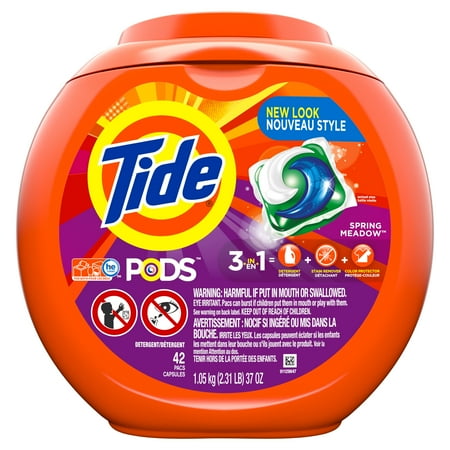 |
| Tide pods are sold in packages as shown. There are various sizes and prices |
Tide is a laundry detergent brand manufactured and owned by Procter & Gamble. Tide has been in some trouble lately due to people eating their laundry pods. Laundry pods have been known to be dangerous if ingested. Even knowing the facts of how dangerous the pods are, tide continues to produce them. The idea of eating Tide pods started in 2017 when, “comedy website CollegeHumor created a fictional video in which a college student tries to resist eating laundry pods, only to end up gorging on them and being taken to the hospital.” (Rettner) This started a movement, a movement called the “Tide Pod Challenge.” This is where teens from all over the U.S take laundry pods and eat them while recording so they can post the content on social media.
| Tide has started to advertise safety measures consumers need to follow |
Stakeholders
In this situation, there are a few stakeholders within this controversy. The stockholders are one of them. When consumers found out the effects of eating the pods, people stopped buying from them and the stock a little turn for the worse. The employees are also affected by the controversy, the employees do not like hearing that elderly men and women are eating laundry pods because they don’t know any better. The pods look like candy so that’s all these adults look at in the situation. The other stakeholders are the consumers who are getting ill from eating the pods. “Two children and six adults have died over the past five years as a result of ingesting the pods.” (Popken)
Individualism
Milton Friedman says, “The only goal of business is to profit, so the only obligation that the business person has is to maximize profit for the owner or the stockholder.” With this said, and Individualist would look at this case and think that it is ethically permissible. This is because, the primary goal in an Individuals way of thinking is to profit. An Individualist is more worried about making the sales, as to discontinuing the pod line because people are eating them.
Kantianism
Kantianism is the theory where you act rationally, don’t act inconsistently in your own actions or consider yourself exempt from rules. Respect others, their autonomy, and individuals needs and differences. Lastly to be motivated by Good Will, where you seek to do what is right because it is right. Kantians also live by the formula of humanity. The formula of humanity is when you don’t use people as a mere means, do not lie, deceive, exploit, or use people to benefit yourself. Kantians would perceive this controversy as unethical. Procter and Gamble isn’t lying to their consumers, but they do know the harm that these pods bring to the people. The fact that they know they are ingesting their product can lead to death, Kantians see that ethically impermissible.
| Tide pods are small and handy for college students and families for quicker laundry prep |
Utilitarianism
Utilitarianism is the theory where happiness is what matters. Not only within yourself, but within others as well. Utilitarian’s would believe that the selling of the pods is ethically impermissible because the unhappiness it brings upon the people that go through the troubles of crises when someone eats the pod, outweighs the company for making the sale.
Virtue Theory
The Virtue theory deals with the act itself. The four characteristics of the Virtue theory are, courage, honesty, temperance, and justice. Procter and Gamble has let the public know the affects if pods are consumed, that is an example of them being courageous because they are letting everyone know that something bad can come of their product. A virtue theorist would see Procter and Gamble as ethically permissible. The reason is Procter and Gamble isn’t lying or hiding information for the public, the function of the pod is to be used to wash clothes, not to be eaten. Since the pods are meant for washing clothes, and it does a good job at that, Procter and Gamble is ethical to a Virtue theorist.
References
Associated Press. “P&G CEO Says Company Working to Stop 'Tide Pod Challenge'.”Chicagotribune.com, 23 Jan. 2018, www.chicagotribune.com/business/ct-proctor-gamble-earnings-20180123-story.html.
Gobel, Brandon. “Dementia Patients and the Laundry Pod Problem.” AARP, 26 June 2017, www.aarp.org/health/healthy-living/info-2017/laundry-pods-killing-dementia-patients-fd.html.
Janeway, Kimberly. “Liquid Laundry Detergent Pods Pose Lethal Risk for Adults With Dementia.” Consumer Reports, www.consumerreports.org/laundry-cleaning/liquid-laundry-detergent-pods-pose-lethal-risk/.
Popken, Ben. “More Adults Have Died from Eating Laundry Pods than Kids.” NBCNews.com, NBCUniversal News Group, 16 June 2017, www.nbcnews.com/business/consumer/laundry-pods-can-be-fatal-adults-dementia-n773366.
Rettner, Rachael. “Don't Eat Laundry Pods: Why the 'Tide Pod Challenge' Is So Dangerous.”Https://Www.livescience.com/61418-Tide-Pod-Challenge-Dangerous.html, www.livescience.com/61418-tide-pod-challenge-dangerous.html
No comments:
Post a Comment